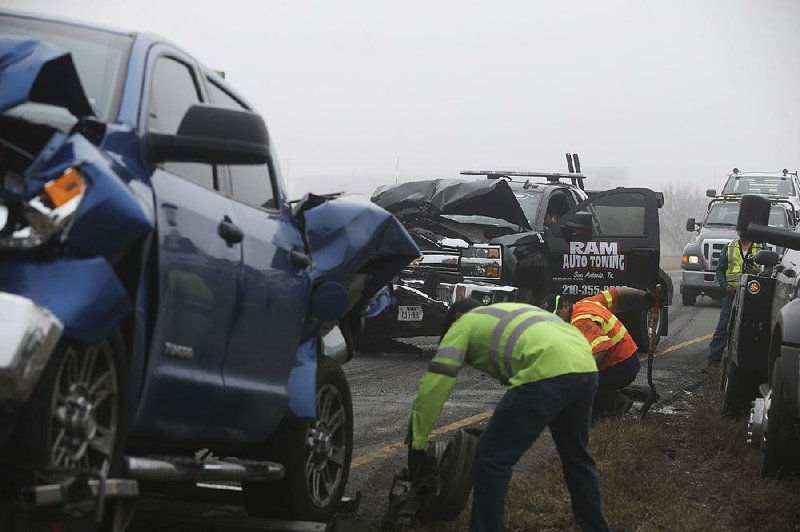DETROIT -- U.S. auto sales slowed in January as buyers recovered from Christmas spending sprees.
January sales fell 1.8 percent to 1.14 million vehicles, or a seasonally adjusted annualized rate of 17.61 million vehicles, down from 17.9 million vehicles a year earlier, according to Autodata.
January is typically the weakest month of the year for U.S. auto sales, and last month appeared to live up to that reputation. General Motors, Toyota and Ford -- the top three in U.S. sales -- all reported declines.
But there are lots of factors that likely will fuel demand in the coming months. Consumer confidence is strong, gasoline prices are low and there are good deals on new vehicles with new technology. Tax refunds will also spur demand. While sales aren't expected to top last year's record of 17.55 million, they're still forecast to come in at high levels.
One unknown is President Donald Trump. Promised tax cuts and infrastructure spending could increase demand for new vehicles. But his threatened taxes on vehicles imported from Mexico could make some new cars more expensive. Mexico sent nearly 2 million vehicles to the U.S. last year.
"If prices go up, there has to be some sort of impact," said Alec Gutierrez, an analyst with Kelley Blue Book. "This is a price-sensitive industry."
Sales at General Motors fell 3.8 percent from January 2016, while Ford's sales were down 1 percent. Toyota and Fiat Chrysler both saw 11 percent declines.
Honda and Nissan both saw 6 percent sales gains thanks to strong truck and SUV sales. Hyundai's sales were up 3 percent. Volkswagen's sales jumped 17 percent.
Winter weather and Christmas debts typically keep buyers away from car dealerships in January. This year, the hangover was even more acute. Jeff Schuster, senior vice president of forecasting for the LMC Automotive consulting firm, said automakers also offered hefty deals in November and December, pulling January sales forward.
"Most of this is payback from a really strong close to 2016," said Schuster, who said he expects sales to rebound the rest of the year.
The deals spilled into January. As demand slows after seven straight years of sales increases, automakers are increasingly desperate to make a sale. Incentive spending averaged an estimated $3,635 per vehicle in January, up 21.6 percent from a year ago, ALG, an auto-industry consultant, said. Car shopping site Edmunds.com said 10 percent of all new car loans in January had zero percent financing.
General Motors Co.'s sales fell 3.8 percent to 195,909 vehicles. GMC brand sales were up slightly but Buick, Cadillac and Chevrolet all saw declines. GM sold 1,162 Chevrolet Bolts in January, one of the first months the new all-electric car was on sale. Sales of its best-seller, the Chevrolet Silverado pickup, dropped 6 percent.
Ford Motor Co.'s sales dropped 1 percent to 172,612 vehicles. Ford-brand sales were off 2 percent, but Lincoln luxury-brand sales jumped 22 percent on strong sales of small SUVs. Sales of Ford's best-seller, the F-Series pickup, rose 12.5 percent as new heavy-duty trucks hit the market.
Fiat Chrysler's sales fell 11 percent to 152,218. The company's Jeep, Chrysler, Dodge and Fiat brands all saw declines. Alfa Romeo sales were up thanks to the new Giulia sedan while Ram sales rose 5 percent on demand for trucks and commercial vans. SUV sales were a continuing strength; sales of the Jeep Grand Cherokee SUV were up 24 percent for the month.
Toyota Motor Corp.'s sales dropped 11 percent to 143,048. Sales of the Camry sedan, the company's perennial best-seller, plummeted 24 percent after Toyota showed off a new version that will go on sale later this year. Sales of the hybrid Prius were down 16 percent, hurt by low gas prices.
Nissan Motor Co.'s sales rose 6 percent to 112,319. Nissan-brand sales were up 3 percent while luxury Infiniti sales jumped 36 percent thanks in part to the new Q60 coupe. Nissan car sales dropped 9 percent but truck and SUV sales were up 24 percent, further evidence of consumers' growing preference for bigger vehicles.
Honda Motor Co.'s sales rose 6 percent to 106,380. Sales at Honda's luxury Acura brand dropped 10 percent, but Honda-brand sales were up 8 percent. The company's best-seller, the CR-V small SUV, saw a 52.5 percent sales increase as a redesigned version hit showrooms.
Hyundai Motor Co. said its sales rose 3 percent to 46,507, a January record for the company. Rising sales for the company's new Genesis luxury brand helped, as did SUVs. Sales of the Hyundai Santa Fe SUV jumped 53.5 percent.
Volkswagen-brand sales rose 17 percent to 23,510. Volkswagen likely got a bump from diesel owners who sold their cars back to the company as part of a nationwide settlement. As of Jan. 14, Volkswagen had processed 96,000 buyback and lease termination offers. At least some of those buyers likely opted for a new, nondiesel Volkswagens, Gutierrez said.
Information for this article was contributed by Tom Krisher of The Associated Press.
Business on 02/02/2017
